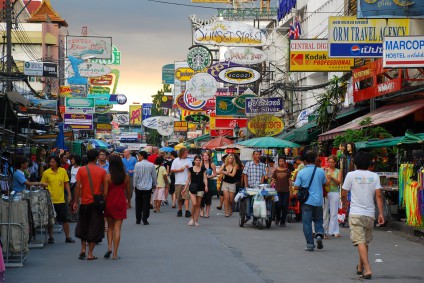Some animals operate on instinct, one hundred percent. Take the aligator, for example. They are born ready. They don’t need parents to supervise them, they don’t need to learn anything specialised, they just hatch and go. Human beings are not one of those animals.
People don’t have a lot of instincts. We’re born with a few. Some people claim to have extraordinary “gut” instincts. But in general, we don’t have a lot going on in that department. To be blunt, humans are not born with the skills to survive.
In lieu of instinct, mankind has developed culture; a means of passing on the knowledge we have gained, generation after generation, to help ensure our survival in different environments. For example, the best way to build a house in the Arctic is not the best way to build a house in the Amazon and vice versa. We have to figure this stuff out and then pass it on to the group.
Culture pervades every facet of life; how we speak, how we dress, what we eat and whom we find attractive. Culture also informs are social norms. It dictates the nuances of polite conduct and acceptable behaviour.
And it varies. Widely.
So it’s not surprising that travelers, of all ages, experience anxiety and confusion when first exposed to a new culture. Any family intending to travel into a vastly different culture, particularly if it is to be a long-term immersion, should understand culture shock, its symptoms and phases, before departing.
The term “culture shock” was first coined by Canadian anthropologist, Kalervo Oberg in 1954, and refers to the stages of adjustment that affect all people as they encounter and settle into another culture.
Oberg described culture shock as, “the anxiety that results from losing all familiar signs and symbols of social intercourse. These signs are the thousand and one ways in which we orient ourselves to the situations of daily life: when to shake hands and what to say when we meet people…
“These cues, which may be words, gestures, facial expressions, customs, or norms are acquired by all of us in the course of growing up and are as much a part of our culture as the language we speak or the beliefs we accept. All of us depend for our peace of mind and our efficiency on hundreds of these cues, most of which are unconsciously learned.”
The basic phases of culture shock, outlined by Oberg, are still recognised today.
Most travelers don’t hang around long enough to move past the “Honeymoon Stage”. But, longer exposure will eventually lead to deeper culture shock.
While the initial exposure to a new culture can be marked by stressors like jetlag, drastic changes in climate and disorientation over differences in lifestyle and standards of living; the honeymoon stage is typically a phase marked by enthusiasm. It can last weeks or even months.
During this phase, the traveler finds cultural differences exciting, quaint and even amusing. Throughout this stage, travelers often reside in hotels, where the staff may speak the visitor’s language and may be acquainted with their customs.
This could also be called the Tourist Phase. The traveler is really only getting a superficial look into the country and its culture. They are seeing what is accessible to a person who is not integrated into daily life, and they are not typically subjected to the frustrations that accompany the local grind.
Occasionally, circumstances lead travelers to remain long enough to enter the second stage.
Phase two is not nearly so pleasant.
At this stage, the newcomer starts to become entrenched in the daily grind while continuing to be ill-equipped to navigate their new life with ease. Travellers become frustrated and often a little bit hostile. They blame the host society for the discomfort they are experiencing.
It is common to form cliques with fellow expatriates for comfort and support. Within these groups, members may start to inflate the virtues of their country of origin while tearing down the new culture, without objectivity or appropriate prospective on either. During this phase, newcomers will resort to stereotyping their hosts – and not in a nice way.
And, according to Oberg, it doesn’t matter how open-minded the traveller is, going into the experience. Given enough time and frustration, at not having our cultural bearings, we will all go through this phase.
We are each limited to our own experience and interpretation of the world. Culture is so subtle and so deeply ingrained in each of us, that it is difficult to accept another way of doing things, without making value judgements.
If the traveler makes it through stage two, without returning home, they will enter the “Final Adjustment” phase. During this phase, newcomers begin to accept the host culture and see the customs as different, rather than wrong. They adapt their behaviour and life becomes easier. Sense of humour returns and the traveler may even become self-deprecating. At this point, return to the country of origin will likely result in reverse culture shock.
Naturally, everyone exhibits culture shock to different degrees and at different paces. As a family, you may find that some members are coping better than others, or that one member has moved onto a new phase while another is lagging at the phase before. Some may even move back and forth through the phases, progressing and regressing on a day-to-day basis.
It is a very complicated issue. The more disparate the cultures are and the longer the immersion, the more likely it is that culture shock will take a toll.
It is important to recognise that the discomfort and anxiety brought on by culture shock is genuine and that, given the right circumstances, it happens to everyone. It is not a sign that someone is ill-suited to travel or that they are closed-minded, or arrogant. It means only that they are human and humans have difficulty integrating into a completely different way of life.
Common signs that a member of your group is experiencing culture shock include:
- Preoccupation with cleanliness. This can relate to excessive fears about the drinking water, food, dishes and bedding.
- Irrational fears of being robbed, cheated, or injured
- Feelings of helplessness.
- Excessive frustration over minor problems
- Dependence on expatriates from the country of origin
- Refusal to learn the language of the host country
- A strong desire to return home and be surrounded by familiar people and places.
Some people will be more prone to severe culture shock than others. While there’s no way to avoid it completely, you can take steps to ease the grief it may cause.
- Learn as much as possible about the culture you are going into, the customs, the food, the social graces and taboos.
- Understand culture shock and its phases so you can recognise it for what it is and attempt to regain objectivity.
- Perhaps the most important thing you can do is learn the language. Learn as much of the language as you can, as quickly as you can. This will help you integrate, make acquaintances, ask for assistance when needed and ingratiate yourself to your hosts.
Speaking at least a little of the local language is useful, even during the tourist phase, particularly if a crisis situation arises. Are the locals putting the sandbags up or taking them down? Take my word for it, when that question crops up, you’re going to want to be able to ask it.
In the end, culture shock is part of the experience of travel. It is jarring. It awakens our consciousness and it opens our eyes to the many ways people live around the world. I believe it’s worth it to experience at least a little culture shock because it leaves us with a better sense of our place in the world…a peek at the big picture.
While it may be painful at the time, I think the perspective that follows a bout of culture shock is a gift worth sharing with our loved ones; children included. – Jen R, Staff Writer




























